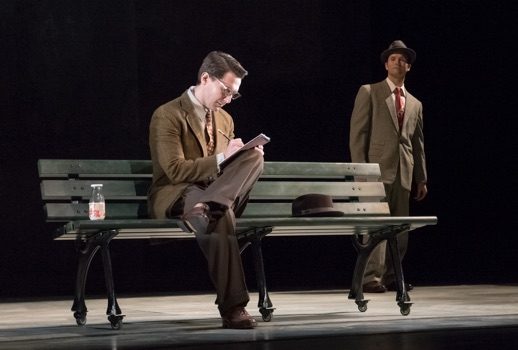

“If I loved you, time and again I would try to say all I’d want you to know.”
The composer Gregory Spears is a unique example of this maxim: one must be “deeply rooted in tradition in order to innovate with integrity.”
This argument, advanced by the theologian Nadia Bolz-Weber, is clearly something of a paradox; radical thinking is possible only when one is deeply invested in the past. The true way to be an iconoclast is to have studied, with great diligence, the icons. Otherwise, their shattering is meaningless and facile.
Spears’ work, while startlingly fresh—at times, almost radical—demonstrates a compelling reverence for its musical forbears. In other words, Spears utilizes the best practices of music history in order to create something original. He appears to be invested in the traditions of Western music, while at the same time pushing and prodding for new modes of expression.
However, while one can sense a vast intelligence coursing through Spears’ work, there is never the feeling that he is out to merely impress. I find his compositions remarkably non-oppositional. And he is unique among his contemporaries in his self-assured posture, his refusal to kowtow to any trends, to ape a cerebral perspective as some kind of rhetorical maneuver. His work is far too generous, far too exuberantly charming—almost rhapsodic in its preoccupation with form and beauty. This is not to say that his music is not difficult—it is. But, its difficulty is in service to beauty.
Despite the dour subject material, Spears’ opera Fellow Travelers is a prime example of the ebullient musical textures he has worked with throughout his career. With a libretto by Greg Pierce, based on the Thomas Mallon novel, the opera imagines a relationship between two men in Washington D.C. during Joe McCarthy’s communist witch hunts.
In September 1953, Timothy Laughlin meets Hawkins Fuller while sitting on a bench in Dupont Circle. Timothy is naïve and Catholic; Hawkins is worldly, cynical, and seductive. The two experience an immediate attraction. After Hawkins—informally known as “Hawk”—uses his influence at the State Department to get Timothy a position as a speechwriter for Senator Charles Potter, the two begin a covert romance, despite the paranoid, homophobic sphere in which they circulate.
Fellow Travelers premiered at the Cincinnati Opera in 2016 with Aaron Blake in the role of Timothy Laughlin, Joseph Lattanzi as Hawkins Fuller, and Devon Guthrie as Mary Johnson, Hawk’s assistant and best friend. And the three reunited last night for the New York premiere of the opera, with the Prototype Festival mounting the same Cincinnati production.
Blake was perfectly cast as Timothy. His tenor was clear and sweet, vigorous and lithe. He projected Timothy’s guilelessness, transparence, and sincerity. And he moved between disparate emotional registers with preternatural ease: longing, joy, sorrow. His performance was courageous.
In contrast, Lattanzi was coy and reserved as Hawk. His baritone seemed too thin for the role, which required a virile swagger, a smooth, crooning quality with pinpoints of rage and aggression. Instead, as a dramatic tactic, he seemed to disengage emotionally. This served the early scenes, where Hawk’s mysteriousness only added to his erotic appeal. However, during the more emotionally vulnerable moments, especially Hawk’s gorgeous Act II aria, Lattanzi’s performance felt hollow.
The character of Mary is an interesting figure within the plot. She represents, just as much as Timothy and Hawk, the “fellow travelers” of the title. As Hawk and Timothy move tentatively into their affair, Mary, too, nurtures a growing feminist consciousness. Where her colleagues might insult homosexuals with cruel epithets, she opens her heart and mind to other possibilities. And like Timothy, her developing political consciousness is connected inextricably to her personal experience.
As Mary, Devon Guthrie performed with warmth and grace. Her vocal finesse was especially exceptional; the soprano, sounding radiantly healthy, leapt through the score’s more arduous passages. And she displayed an emotional, dramatic commitment beyond her years.
These performers, and the material they brought to life, would have been served by a more competent production. Kevin Newbury’s direction lacked imagination. Where Pierce’s libretto called for simultaneity and seamless movement between different settings, Newbury failed to clarify these important distinctions. Moreover, the primary sex scene between Timothy and Hawk was quite awkward, lacking spontaneity and realism, despite the rapturous soundscape provided by Spears.
The sets, by Victoria “Vita” Tzykun, were cursory, small sketches rather than fully realized images. And while the narrative trotted along efficiently, George Manahan’s conducting felt a little sloppy; his reading lacked precision—Spears’ score deserved better.
Fellow Travelers is a multifarious work of art. Its discourse is not confined to pre-Stonewall sexual practices; it bleeds into our own contemporary conversations on monogamy, queer itinerancy, and politics. While the plot may appear simple enough, its clean, linear structure reveals latent depth and complication. And though it is a period piece, Fellow Travelers is still poignantly relevant, worthy of repeated viewings.
Fortunately, the opera will be given a new production at the Lyric Opera of Chicago, where I hope the slight deficiencies of the Cincinnati iteration will be transformed. The score and libretto certainly call for a more cohesive, artistically ambitious mounting. No matter what, Prototype’s Cincinnati production is worthwhile viewing, if only because of the material’s merits; and it’s especially gratifying to see an opera of this quality enter the repertory.
Photo: Jill Steinberg

























Comments